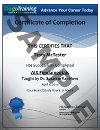Module 00: Course Introduction
Module 01: Introduction to Programming
- What is a computer language?
- Why should you learn a computer language?
- What computer language should you learn first?
- Demo: Let's Make our First Statement in JavaScript!
- Lab Exercise: hello.html
Module 02: Introduction to JavaScript
- JavaScript Advantages
- Web Browser and JavaScript
- .html File Extension
- Editing hello.html
- // and /* … */
- Demo: Hello World
- Lab Exercise: Hello World
Module 03: Functions Part 1
- About Functions
- alert() w/o input parameter
- Semicolon
- alert() w/Input parameter
- Strings
Module 04: Functions Part 2
- Defining Functions without inputs
- Defining Functions with inputs
- Returning values from Functions
- Demo: Using the Alert Function
- Lab Exercise: Using the Alert Function
Module 05: Variables
- JavaScript Variables
- var keyword
- String variables
- Number variables
- Operators: +, -, *, /
- Confirm Function
- true, false
- prompt() Function
- Demo: Using Variables
- Lab Exercise: Using Variables
Module 06: Making Decisions
- if statement
- if else statement
- confirm() with if statement
- confirm() with if-else statement
- Compare Operators: ==, <. >, <=, >=
- if-else-if…
- Demo: Making Decisions
- Lab Exercise: Making Decisions
Module 07: Repeating Steps
- Repeating fixed number of times
- Repeating variable number of times
- while statement
- while statement with prompt()
- Checking for null
- Demo: Repeating Steps
- Lab Exercise: Repeating Steps
Module 08: Course Summary
- Put All Skills Together To Write a Javascript App
- Review the key concepts
- Write a temperature conversion script!
View all course details
The only prerequisite is a basic familiarity with computers, along with an eagerness to learn programming. You do not need any programming experience.
View all course details

